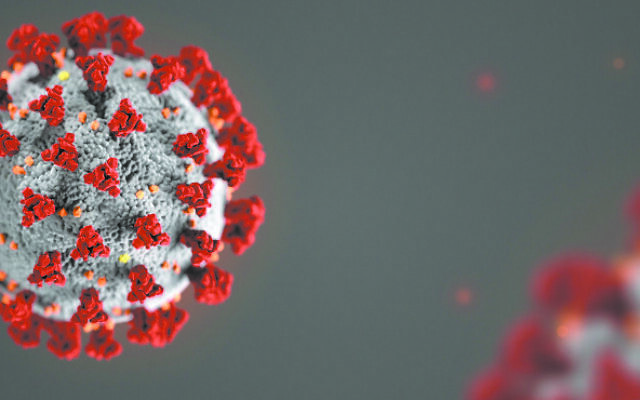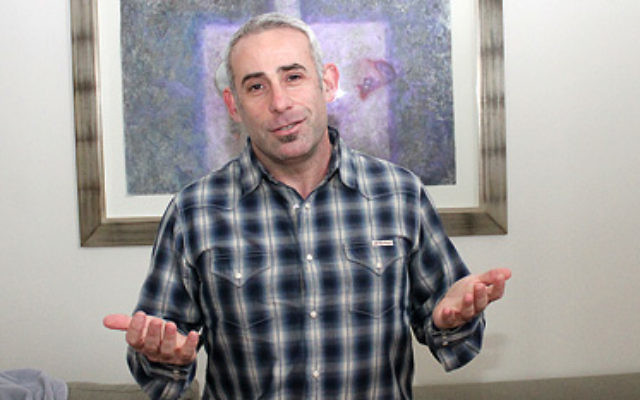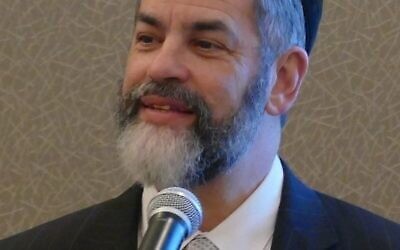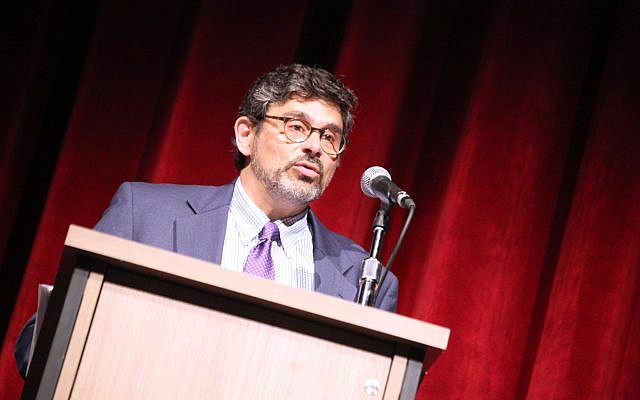Being Jewish in the Time of Coronavirus
Synagogues and Jewish institutions discuss how to take community precautions as COVID-19 spreads globally.
Dave Schechter is a veteran journalist whose career includes writing and producing reports from Israel and elsewhere in the Middle East.

One of the cherished traditions at Congregation Bet Haverim comes with recitation of the Hamotzi prayer over bread, after Shabbat services.
As the rabbi recites the blessing, a web of worshippers is formed, beginning with a hand placed on the rabbi’s shoulder, and a hand placed on that person’s shoulder, and so on, until everyone present is connected.
But no more. The coronavirus designated as COVID-19 has put a stop to that tradition.
Henceforth, “we will refrain from touching one another” during the blessing of the bread, Rabbi Josh Lesser wrote to members of his congregation.
As at congregations throughout Atlanta, CBH members were asked to refrain from kissing, hugging and shaking hands. “This will likely feel a loss to the closeness of our culture, but in the interest of reducing the risk of transmission, let us find new ways to welcome one another warmly like touching elbows and expressing our warmth in words,” Lesser wrote.

Congregations, schools, and other Jewish institutions throughout the Atlanta area are coping with a new reality, one caused by the spread of COVID-19, a coronavirus that the World Health Organization has said was unknown before the December 2019 outbreak in Wuhan, China.
The faithful have been advised to change their ways, particularly when it comes to kissing a mezuzah or the Torah. For example, during hakafot, when the Torah is carried through the sanctuary, members of Temple Beth Tikvah have been asked to “use your personal tallit to touch the Torah or give a simple nod of the head towards the Torah.” The guidance at Congregation Beth Tefillah to “use alternate means for acts such as kissing the Torah or a mezuzah to show honor and respect,” came with a benediction, “May G-d bring a speedy recovery to all who are ill, and bless us all with good health and happiness.”
Shaking hands is another problem. “Wishing someone ‘Shabbat shalom’ or ‘yasher koach’ can be done verbally, with a nod of the head, or an ‘elbow bump,’” Rabbi Adam Starr wrote to the members of Ohr HaTorah. “I ask that no one be offended when other congregants refrain from shaking hands, and please expect that I will not be shaking hands as well. We also ask that you refrain from kissing the Torah as it passes by; to show honor to the Torah, we suggest pointing to the Torah as it passes and kissing your own hand.”

Fist or elbow bumps are the new handshake. “Consider adopting alternative greetings like waving or place one or both hands over your heart,” the leadership of Beth Tikvah wrote to the membership. When it comes to handling food, “During HaMotzi and onegs & kiddushes, please use a napkin or utensil to take challah and/or treats.”
The approach at Congregation Beth Jacob is two-fold: the religious and the practical. “Generosity, concern for others, constructive and inspired speech, being a contribution and not a source of strife, avoiding looking for blame, and above all, davening and asking Hashem for health and protection – these are the behaviors of a religious community,” Rabbi Ilan Feldman wrote to his congregation.
Beth Jacob members should avoid coming to shul with symptoms of illness, Feldman wrote, “even if you are a chiyuv (obligated to recite kaddish or lead davening).” Hand sanitizer will be available and “use is permitted on Shabbos as long as sanitizer is rubbed thoroughly and absorbed into the skin,” Feldman wrote.

Hand sanitizer dispensers are proliferating throughout the community, including at The Selig Center, home to the Jewish Federation of Greater Atlanta and the William Breman Jewish Heritage Museum. There, a sign affixed to the front door, reads: “If you are sick with a persistent cough or fever, please postpone your visit with us and do not enter the building today.”
This is a busy time in the Jewish calendar, with the holidays of Purim, which began the evening of March 9, and Passover, which begins the evening of April 8. “Although this is a wonderful time of the year, these communal gatherings put us all at risk and we need to all take appropriate precautions,” Beth Tefillah advised its members.
To serve those who might be disinclined to attend in person, The Temple, Temple Sinai and Temple Kol Emeth were among those included on a list of synagogues nationally that livestreamed megillah readings on Purim.
The coronavirus is just one more factor as Lauren Menis plans her daughter Sarah’s bat mitzvah for March 21 at Temple Emanu-El. “I’m trying not to get really stressed. So far only a few cancellations but expecting more,” she messaged.
Lesser wrote to CBH about the values of pikuach nefesh (preserving life) and shmirat haguf (protecting the body): “Preserving life is often seen as the ultimate Jewish value, trumping virtually all other commandments. In addition, Judaism teaches that taking care of our bodies is incredibly important, especially if we understand that we are created in the Divine image. We are responsible to each these sacred values by following the instructions and recommendations of medical experts in preventing the spread of the virus.”
The Marcus JCC, where many in the Jewish community go to care for their bodies, is taking a proactive stance. “Our Support Services team is currently using high-level antiviral cleaning agents to properly disinfect the entire facility on a daily basis,” JCC Director Jared Powers wrote to members. “Staff members are being

reminded to follow procedures for sanitizing toys in preschool classrooms and Kid Zone, equipment in the fitness center, high-use surfaces, and equipment/supplies throughout the facility.”
In addition, “We will be making sure that all youth program participants engage in frequent and proper hand washing and that we remind them about proper use and disposal of tissues. We’d like to remind our adult participants as well,” Powers said.
If face-to-face meetings with clients are not possible, Jewish Family & Career Services plans to employ technology to bridge the gap. “As a client-centered social service agency, we intend to continue serving our clients in times of public health disruption, should that occur. We will utilize tele-mental health protocols, phone sessions, and all other services we can do remotely,” JF&CS stated on its website.
Jewish day schools are reassessing procedures and plans, as well. The proper way to wash hands might be considered a mundane subject, but it is receiving extra attention from students and staff at The Epstein School, said David Abusch-Magder, the head of school.
As this article was written, The Epstein School was considering whether to proceed with its seventh grade trip to Washington, D.C., in the third week of March, and its eighth grade trip to Israel in the third week of April, both trips

involving about 40 students.
At The Weber School, the contents of a letter sent Feb. 28 to the school community by Rabbi Ed Harwitz, the head of school, and principal Shlaina Van Dyke, were discussed with students and faculty during an assembly that day. “All students, faculty and staff who are ill or feeling ill should stay home until they recover. If you have any concerns, we ask that your child be examined by a medical professional. Depending on the diagnosis, Weber may require clearance from a doctor to return to campus,” the letter said, with that last line written in bold-faced type.
The Tam Institute for Jewish Studies at Emory University, “due to health/travel concerns and out of an abundance of caution,” canceled the 24th annual Tenenbaum Lecture scheduled for March 19. The speaker was to have been professor David E. Fishman from the Jewish Theological Seminary, the author of “The Book Smugglers: Partisans, Poets and the Race to Save Jewish Treasures from the Nazis. The True Story of the Paper Brigade of Vilna.”
Coronavirus concerns also have impacted the weekend civil rights history trips led by Billy Planer through his Etgar 36 program. In a year’s time, more than 2,400 people travel with Etgar, including synagogues and school groups from throughout the country, to visit historic sites in Atlanta and Alabama.
As of the first weekend of March, “Basically, so far just one school, a Jewish day school from northern California, canceled. Everyone else has called to see what

options they have. The temple I am with from Westchester [N.Y.] this weekend originally had 90 people on the trip and now we have 60,” Planer said. [Update: As of March 12, 16 trips over the next six weeks have been canceled.]
Back at Bet Haverim, when it came time for the blessing over the bread, rather than hands on shoulders, worshippers pointed toward their neighbors or toward the plate of challah. “It brings a sense of gravity when you alter a ritual that you’ve been doing for beyond 20 years,” Lesser said.
He told those attending services, “Some of you wouldn’t want to give up this ritual, but the truth is, because we are in community, separately from what each of us might want, we have to figure out what might work best for a group of people.”
Instead of delivering a sermon, Lesser offered a text from the Talmud about how a group of rabbis dealt with a contagious disease, prompting discussion about how people act when only limited information is available, and are uncertain whether they are overreacting or under reacting. “It felt like such a helpful release valve for people to recognize the kind of anxiety we’re living in,” he said. In this new reality, “We may need to be more thoughtful about how we connect with each other. We can connect with our eyes. We need to be more present than just putting a hand on someone’s shoulder.”
For Abusch-Magder the coronavirus has changed a cherished personal habit, one that he feels strengthens emotional and personal relationships with his students at The Epstein School. “I’m a big high-fiver with the kids,” he said. Now, “we’re being more cautious. We’re elbow bumping. It’s less satisfying, but it is what it is.”
[Note: The author is a member of Bet Haverim but did not attend the service described here.]



comments